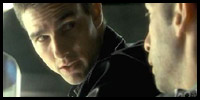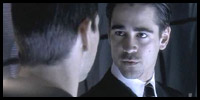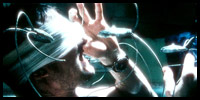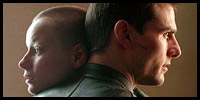
 |
Minority Report (2002) Directed by Steven Spielberg Cast: Tom Cruise, Max Von Sydow, Colin Farrell, Samantha Morton, Kathryn Morris, Arye Gross, Ashley Crow, Lois Smith, Jessica Harper, Peter Stormare, Tim Blake Nelson, Jessica Capshaw, Anna Maria Horsford, Tyler Patrick Jones, William Mapother 2002 – 145 minutes Rated: Reviewed by Dustin Putman, June 23, 2002.
Special Note: This review contains some spoilers.
 Based on the short story by Philip K. Dick, "Minority Report" marks the second futuristic, science-fiction epic Steven Spielberg has made in as many years (after what I believe to be his greatest achievement, "A.I.: Artificial Intelligence"). For Spielberg, undeniably one of the most influential and visionary filmmakers of his time, the film almost seems tailor-made for his marvelous visual sense and stunning talent for storytelling. For all of its sweeping technical flourishes and seamless visual effects, however, "Minority Report" is as shallow and characteristically vacant as "A.I." was emotionally resonating and creatively groundbreaking. In other words, though it pains me to conclude, Steven Spielberg's latest opus is one of the weakest films he has made, to date.
Based on the short story by Philip K. Dick, "Minority Report" marks the second futuristic, science-fiction epic Steven Spielberg has made in as many years (after what I believe to be his greatest achievement, "A.I.: Artificial Intelligence"). For Spielberg, undeniably one of the most influential and visionary filmmakers of his time, the film almost seems tailor-made for his marvelous visual sense and stunning talent for storytelling. For all of its sweeping technical flourishes and seamless visual effects, however, "Minority Report" is as shallow and characteristically vacant as "A.I." was emotionally resonating and creatively groundbreaking. In other words, though it pains me to conclude, Steven Spielberg's latest opus is one of the weakest films he has made, to date.
 Set in a surprisingly realistic vision of what Washington, D.C. might look like in 2054, John Anderton (Tom Cruise) is the top detective on the police force's relatively new Pre-Crime Unit. Through three pre-cog oracles whose minds hold the key to the future, the Pre-Crime Force, headed by Director Burgess (Max Von Sydow), is able to stop predestined murders before they occur. The alleged success of the program has cut down on major crimes in D.C. by ninety percent.
Set in a surprisingly realistic vision of what Washington, D.C. might look like in 2054, John Anderton (Tom Cruise) is the top detective on the police force's relatively new Pre-Crime Unit. Through three pre-cog oracles whose minds hold the key to the future, the Pre-Crime Force, headed by Director Burgess (Max Von Sydow), is able to stop predestined murders before they occur. The alleged success of the program has cut down on major crimes in D.C. by ninety percent.
When the latest murder suspect name comes up, Anderton is dismayed to learn that it is his own. Without never having met the victim before, Anderton is convinced that someone—possibly federal agent Danny Witwer (Colin Farrell), who is after his job—is trying to ruthlessly set him up. With the police suddenly after him, Anderton has no choice but to go on the run. Breaking into the Pre-Crime building, he kidnaps the most talented of the three pre-cogs, Agatha (Samantha Morton), convinced that what she knows about his future is the key to clearing his name and saving his life.  The general premise of "Minority Report" is a novel one, fascinating in the way the world has developed enough in fifty years that the police force has begun acting, more or less, as God to citizens. The moral implications of such a debate—whether a person's future is predestined or capable of change—are thought-provoking, to be sure, but get lost in a screenplay (credited to Scott Frank and Jon Cohen) more interested in action set-pieces, and a film that chooses style over any form of hard-edged substance. While several of the action scenes are astonishingly executed, including a death-defying jump across cars hovering in the air, and a search for John by electronic spiders sent to check the retinas of an apartment complex's tenants, what surrounds them is a thoroughly unsatisfying emptiness posing as a study of serious-minded issues.
The general premise of "Minority Report" is a novel one, fascinating in the way the world has developed enough in fifty years that the police force has begun acting, more or less, as God to citizens. The moral implications of such a debate—whether a person's future is predestined or capable of change—are thought-provoking, to be sure, but get lost in a screenplay (credited to Scott Frank and Jon Cohen) more interested in action set-pieces, and a film that chooses style over any form of hard-edged substance. While several of the action scenes are astonishingly executed, including a death-defying jump across cars hovering in the air, and a search for John by electronic spiders sent to check the retinas of an apartment complex's tenants, what surrounds them is a thoroughly unsatisfying emptiness posing as a study of serious-minded issues.
 Whatever deep-rooted involvement one might have grown to have in John Anderton's dire predicament proves sterile in a sea of blank faces posing as characters. Precious little is ever learned about John, except that he blames himself for his son's kidnapping six years ago, is separated from his wife (Kathryn Morris), and has a secret drug problem, and even fewer reasons are given for why we should like or care about him. Not being able to find the heart in John, or anyone else in this story, is one of Spielberg's most fatal missteps. Tom Cruise (2001's "Vanilla Sky") is not the greatest actor of his generation, but you can at least rely on him to lend credence to his roles. As fugitive John Anderton, Cruise is unusually stale and lifeless, closely matching Spielberg's unsteady take on the character.
Whatever deep-rooted involvement one might have grown to have in John Anderton's dire predicament proves sterile in a sea of blank faces posing as characters. Precious little is ever learned about John, except that he blames himself for his son's kidnapping six years ago, is separated from his wife (Kathryn Morris), and has a secret drug problem, and even fewer reasons are given for why we should like or care about him. Not being able to find the heart in John, or anyone else in this story, is one of Spielberg's most fatal missteps. Tom Cruise (2001's "Vanilla Sky") is not the greatest actor of his generation, but you can at least rely on him to lend credence to his roles. As fugitive John Anderton, Cruise is unusually stale and lifeless, closely matching Spielberg's unsteady take on the character.
 The other actors are mirages posing as people. Colin Farrell (2002's "Hart's War"), as the shady Danny Witwer, barely makes any impression until it is uncovered that his entire character has had no purpose but to be a clumsy red herring. Max Von Sydow (1998's "What Dreams May Come"), as Pre-Crime Department head Burgess, is forced to bide his time appearing soft-spoken until his true colors are revealed. As pre-cog Agatha, Samantha Morton (1999's "Sweet and Lowdown") is the only performer to gain the viewer's sympathy, if only because you cannot help but feel sorry for the precious life she has lost. Morton is effective and focused, but she has little to do and even less to say. Everyone else, including the Pre-Crime officers, family members, and crime suspects, have non-existent dimensions.
The other actors are mirages posing as people. Colin Farrell (2002's "Hart's War"), as the shady Danny Witwer, barely makes any impression until it is uncovered that his entire character has had no purpose but to be a clumsy red herring. Max Von Sydow (1998's "What Dreams May Come"), as Pre-Crime Department head Burgess, is forced to bide his time appearing soft-spoken until his true colors are revealed. As pre-cog Agatha, Samantha Morton (1999's "Sweet and Lowdown") is the only performer to gain the viewer's sympathy, if only because you cannot help but feel sorry for the precious life she has lost. Morton is effective and focused, but she has little to do and even less to say. Everyone else, including the Pre-Crime officers, family members, and crime suspects, have non-existent dimensions.
 Eternally grey-toned, Spielberg's stylistic choice to go for gloomy grittiness adds atmosphere to the proceedings, but the stringent absence of color or picture clarity from cinematographer Janusz Kaminski grows tedious after a while. The same goes for the progressively muddled plot developments, which have twisted and turned to such a degree by the finale that total convolution takes over. Cold, unmoving, and desperately in need of a beating heart and a soaring soul, "Minority Report" is one of the year's most depressing disappointments.
Eternally grey-toned, Spielberg's stylistic choice to go for gloomy grittiness adds atmosphere to the proceedings, but the stringent absence of color or picture clarity from cinematographer Janusz Kaminski grows tedious after a while. The same goes for the progressively muddled plot developments, which have twisted and turned to such a degree by the finale that total convolution takes over. Cold, unmoving, and desperately in need of a beating heart and a soaring soul, "Minority Report" is one of the year's most depressing disappointments.
©2002 by Dustin Putman |
 |













